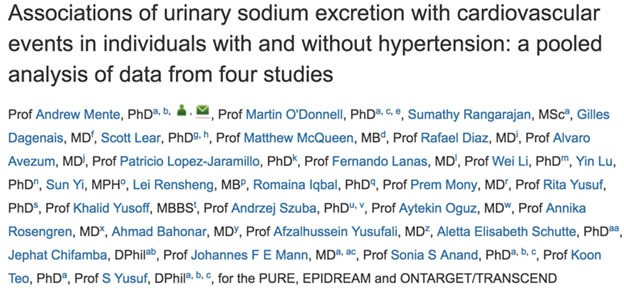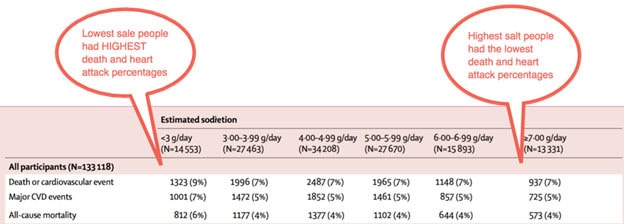Does lowering your salt intake actually threaten your health, or does it help to reduce salt consumption?
Doctors think that the effect of salt on blood pressure is to raise it.
They think that high salt intake makes blood pressure worse and they caution their patients to “watch the salt.”
This popular notion has caused a lot of bland diets for patients with high blood pressure.
However, the truth about salt is much different than they think!
Here is a study that shows how much salt you should probably be eating to live a long time.

So the first thing that makes this interesting is that they are monitoring sodium excretion —
That means that the researchers are measuring how much salt we are excreting in our urine.
People sometimes fail to tell the truth about how much salt they are eating.
They may feel guilty and lie — or they may simply not realize how much salt was in something they ate — or they even just forget something.
But the amount of salt that’s in their urine can be measured objectively.
So despite what they claim in the conclusion of the study, the data is very clear.

So as you can see, the far-left column shows people who consumed less than 3 g of salt per day.
That’s not much salt, and those people have a 6% chance of death within the scope of the study.
But if you look at the farthest right column where they ate more salt, all-cause mortality is 4%.
That’s one-third lower risk for HIGH salt intake, than those eating less salt!
What makes this even more significant is that this study included a total population of 133,118 people.
And the larger a study population, the more likely a finding is true for the rest of the population.
The researchers found that the results are pretty much dose-dependent — the more salt you have, the longer you will live.
This is totally contradictory to what the doctors have been telling us.
But if you read the study, it makes some very interesting points.
INCREASED SODIUM INTAKE WAS ASSOCIATED WITH GREATER INCREASES IN SYSTOLIC BLOOD PRESSURE IN INDIVIDUALS WITH HYPERTENSION (2·08 MM HG CHANGE PER GRAM SODIUM INCREASE).
So let’s translate this into English.
If you have 3 g versus 6 g of salt, then you are going to have a 6 mm Hg difference in blood pressure on average.
That means that instead of being 150/90, you would be 144/90.
It’s not much of a difference.
The difference is barely significant at all.
But the salt health effects of that difference on your lifespan are dramatic.
Your chances of death are going to skyrocket by minimizing your salt.
So obviously, lowering salt is not good if you want to live a long time.
Some of the longest-lived cultures are already seeing these results.
The study points out that many cultures consume over 7 g of salt per day.
In fact about 22% of the people living on the planet consume more than 7 g a day of salt — many of these people never have high blood pressure, EVER.
It’s clear to see that the whole “low-salt versus high-salt” high blood pressure theory has been thoroughly and utterly debunked.
In fact, you want to make sure you’re getting plenty of salt.
If you have high blood pressure, you may want to eat a lot more than 7 g.
I would experiment with raising salt and see what you think.
See how you feel.
Salt your food to taste instead of some amount set by your doctor.
Use your salt appetite to determine how much salt you need to eat.
Your body really will tell you these things… that’s what causes cravings.
Try to have some salt in the morning.
One way to do it would be to dissolve about a teaspoon of salt into some orange juice and drink it when you wake up.
This simple tactic can help stop the adrenaline and cortisol that you have built up overnight.
You can get the day started feeling wonderful.
Meanwhile, don’t believe what doctors are telling you about blood pressure and salt — because it is pure bunk.
Citations
Associations of urinary sodium excretion with cardiovascular events in individuals with and without hypertension: a pooled analysis of data from four studies
http://www.thelancet.com/journals/lancet/article/PIIS0140-6736(16)30467-6/fulltext?rss=yes
Click for more information on eating more salt, for information on diet and exercise, and for ways to increase your salt intake.
